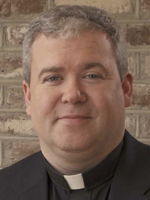The task of promoting vocations to the priesthood and religious life must be a continual and creative process. The Church needs to engage its membership, and emphasize that God is still calling people to consecrated service.
In promoting vocations to Church service, programs and perspectives should change and adjust in order to accompany and encourage those who might be called. This is particularly important in a time when priestly and religious vocations are on a decline. In the promotion of these vocations, various ideas are suggested on how the Church might solve the decline.
Why not ordain women?
Oftentimes, this question is raised as a gender issue, while the Church sees this as a question of fidelity.
Some say that the fact that women cannot be ordained is an indication that the Catholic Church does not like women or argue that it is sexism in ministry. The Catholic Church has no problem with women and supports their involvement in ministry and in the workings of the Church. Baptized Catholic women can do almost everything that a non-Catholic, ordained female minister can do in Christian ministry.
The difference is the view of ministry and specifically of priestly ministry. The Catholic Church acknowledges that Jesus Christ only ordained men to the priestly ministry, and it seeks to remain faithful to this divine precedent. The Church sees itself as not having the authority to alter this practice.
The Church sees the priesthood as a sign of service and not of power. It stresses that all are called to ministry, and that the focus of the Church’s life is not the priesthood but holiness and sainthood.
Why not let priests marry?
Many people believe that the greatest hindrance to an openness to the priesthood is celibacy. Actually, with the younger generation, the challenge is much greater. The difficulty is not simply celibacy, but commitment itself. This indicates a real need for evangelization on how the believer is called to understand commitment, freedom, love, perseverance, integrity, and other virtues.
With this in mind, it must be noted that young men would not respond in greater numbers if celibacy were suspended. The struggle is with commitment.
Beyond this broader issue of commitment, however, there is a question about celibacy.
Celibacy should be seen by the inquirer and by the Church as a gift given by God. It is a sign of the priest’s imitation of Christ, his desire to selflessly serve and be completely available to others. The priest’s celibacy is a reminder that we do not live for ourselves.
Celibacy is a call for the priest to love more, not less. It’s a summons for him to give of himself to others, and to reflect the unity of Christ with the Church.
While celibacy is a discipline and could change, the importance of celibacy today is perhaps even greater than in previous ages precisely because it is a sign of commitment and service. Rather than discouraging young men from the priesthood, celibacy is exactly what attracts many young men to the priesthood today.
Why can’t deacons and the laity be more involved and lessen the urgency for priests today?
Certainly, the role of the permanent deacon is being expanded and developed since it was restored by Vatican II, and definitely the laity have an essential role to play in ministry and in the life of the Church. Even with these acknowledgements, however, the priest’s sacramental, teaching, and pastoral ministry are unique and cannot be replaced or diminished by other ministers.
The priest holds the office of Christ in the Church. He represents the presence and power of God to the local community of faith. He is a shepherd, prophet, and father to the members of the Church.
Even with the necessary role of the deacon and the laity, the Church needs priests and their ministry. Rather than seeing one replace the other, we should see everyone playing their role in a way that complements and strengthens the Church.

